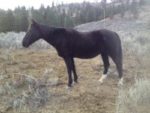10 Pointers on Parasites for the Fall season
Reference: Adapted from a similar article posted on www.rivasremedies.com
Fall is a good time to address parasites since once the eggs are swallowed they will prepare to hibernate in the intestinal walls or encyst to other organs for the winter. Below are a few points to keep in mind to keep your horse healthy and parasite free this fall:
- Parasites produce toxins including ammonia; ammonia stresses the liver and kidneys, interferes with brain function and can contribute to laminitis.
- Encysted parasites are those parasites in the larval state that have formed a protective membrane around themselves and have migrated from the hindgut (large colon and cecum) through the intestinal walls and into the liver, kidneys and/or heart/arteries. If left untreated they are capable of causing many health problems: weight loss, a dull coat, poor appetite, diarrhea, fatigue, liver stress, leaky gut and colic.
- Encysted parasites do not usually respond to herbal or homeopathic dewormers, however it is usually either the long-term/heavily infested horses that have a problem with encysts.
- Most horses with long-term and/or heavy loads of parasites are anemic due to the blood loss. Low iron levels have a significant effect on overall health including lowering the resistance to parasites, contributing to chronic infections and depressing the immune system. Cases of anemia should always be treated with Iron-Up, an organic form of iron.
-
Chemical de-wormers, while often necessary, do not always need to be administered as a full dose (i.e. entire syringe) for every horse. Mildly infected horses need less than a full dose and some horses, including those with encysts, will require a small amount repeated two or three times one to two weeks apart. Heavily infested horses also usually require more than one dose.
- It is not necessary to “syringe” a horse with a chemical de-wormer – this is an invasive practice. Smaller doses can easily be hidden in feed and larger doses can be spread out throughout the day also hidden in feed.
-
Do not routinely de-worm your horse with chemicals unless you have a fecal analysis done to determine if it is even necessary. It is not appropriate to use chemicals for prevention.
-
No matter what de-worming program you are using – natural or chemical – make use of regular fecal analyses to show if your program is working or not.
-
The best defense against parasites is a healthy hindgut with a balanced eco-system, adequate levels of important nutrients and a strong immunity.
- Horses with strong digestion and intestines are not attractive to parasites who must rely on weakening their host for optimum survival. In fact, it is estimated that only one-third of the herd actually carries the parasite loads.


